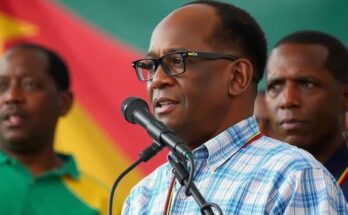Tunisian President Kais Saied faced a presidential election on October 6, 2024, amid notable voter apathy, with only 27.7% turnout. His main opponent, Ayachi Zammel, was imprisoned before the election, leading to criticisms of the electoral process as undemocratic. Despite past controversies and a tumultuous term, Saied is expected to secure victory.
On October 6, 2024, Tunisians participated in a presidential election where incumbent President Kais Saied faced two challengers: the imprisoned businessman Ayachi Zammel and Zouhair Maghzaoui, a leftist candidate who previously supported Saied. Voter turnout was notably low, with only 27.7% of eligible voters casting their ballots, as dissatisfaction pervaded the electoral process following a campaign marked by arrests of potential opponents to Saied’s rule. Polling indicated a lack of enthusiasm in the capital, Tunis, as many citizens expressed skepticism about the legitimacy of the election, labeling it a sham amid concerns over an authoritarian bend in governance. Despite a tumultuous first term characterized by economic grievances and controversial actions such as suspending parliament and reforming the constitution to expand presidential powers, Saied is anticipated to secure victory due to the elimination of major competition. While some opposition members chose to abstain from voting, citing an undemocratic process, others emphasized the importance of participation as a civic duty. Statements from voters underscored their desire for improvement in national affairs, despite the prevailing atmosphere of apathy and doubt regarding the electoral framework. The electoral commission faced criticism for disqualifying multiple candidates and was criticized for disregarding a judicial ruling to reinstate them.
Tunisia’s presidential election occurs against a backdrop of significant political distress following the Arab Spring, which initially fueled hopes for democratic reform. Coming to power amid widespread discontent with the political elite, President Kais Saied has faced increasing scrutiny and allegations of authoritarianism since he assumed control. His governance style has involved consolidating power and repressing dissent, resulting in a political landscape that has increasingly stifled opposition voices. With two challengers, including one incarcerated, the election reflects ongoing tensions between the desire for democratic processes and the reality of political repression.
The recent presidential election in Tunisia marks a pivotal moment as voter apathy and disillusionment with the political system overshadowed the electoral process. With low turnout and significant challenges facing the opposition, the potential re-election of President Kais Saied reinforces concerns regarding the future of democracy in Tunisia. Citizens’ calls for improved governance highlight the pressing need for accountability and responsiveness within a political environment increasingly perceived as fixed and unyielding to change.
Original Source: apnews.com




